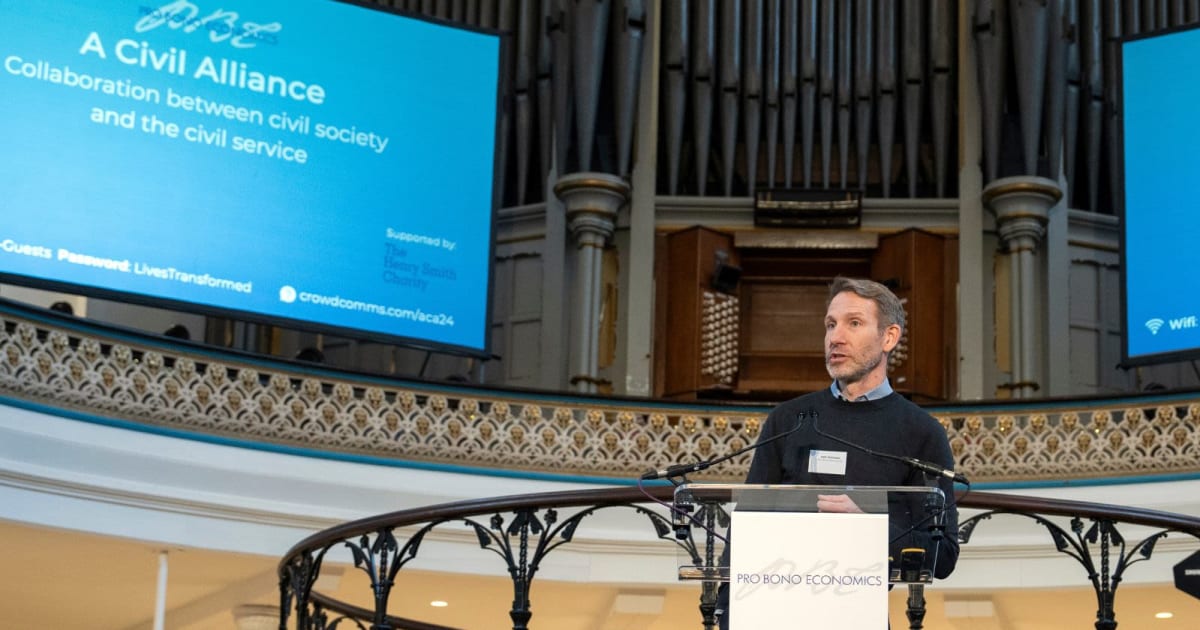By Hannah Corbett, Head of Communications
The relationship between government and civil society is undergoing a much-needed refresh. At the heart of this renewal lies the Civil Society Covenant, an initiative that seeks to redefine collaboration between civil society organisations and the civil service.
To explore this opportunity, Pro Bono Economics hosted “A Civil Alliance,” an event attended by 300 people from across these two interconnected sectors. The aim? To uncover how closer collaboration can drive better outcomes for communities across the UK.
Setting the stage for collaboration
The event served as a platform for sharing best practices, discussing the Civil Society Covenant Framework, and brainstorming structural changes that could support more effective partnerships.
The Covenant, still in its consultation phase, is designed to formalise principles of recognition, partnership, participation, and transparency. These principles aim to create a stronger, more integrated working relationship between the government and civil society, with each contributing its unique strengths.
The call for a reset
Stephanie Peacock MP, Minister for Sport, Media, Civil Society, and Youth, highlighted the government’s commitment to this partnership. She described the Civil Society Covenant as an ambitious reset to address challenges by using the unique strengths of civil society.“This reset is about opening the door for honest, open, and productive relationships between government, civil society, and communities. Government can do many things, but it doesn’t have the same local knowledge, trust, and understanding of challenges as civil society does.”
In her address, Peacock drew from her experience in Barnsley, where initiatives such as Ward Alliances demonstrated the power of collaboration. These alliances—bringing residents and councillors together—enabled grassroots decision-making that led to impactful local programs, from addressing loneliness among seniors to supporting youth sports teams. Barnsley’s efforts earned it recognition as a double “Council of the Year” winner in 2023.
Peacock also cited successful projects such as the Kirklees Better Outcomes Partnership, funded by DCMS’s Life Chances Fund. This initiative restructured housing support services in West Yorkshire through innovative collaborations between local government, charities, and social investors, offering a blueprint for broader national initiatives.
Shared purpose: A common vision for public good
Nicole Sykes, Director of Research, Policy, and Communications at PBE, emphasised the intertwined missions of the civil service and civil society. Drawing from the findings of The Law Family Commission on Civil Society she outlined how both sectors are rooted in public service and political neutrality, working towards shared goals of societal improvement.
“The walls between our sectors are porous, with civil servants becoming charity trustees and charity leaders engaging in government consultations. This cross-pollination of expertise enriches policymaking and improves people’s lives.”
Nicole pointed to concrete benefits, such as civil servants using their professional development days to volunteer with charities, which not only enhances wellbeing and productivity within government but also supports charities in fulfilling their missions.
She highlighted the value of mutual learning, noting that civil society organisations bring invaluable grassroots insights to policy design. Civil servants, on the other hand, possess governance and strategic skills that can bolster the operational effectiveness of charities.
Building a framework for the future
Barriers to collaboration still exist, including communication challenges and differences in operating cultures. However, the proposed Civil Society Covenant seeks to address these by supporting mutual understanding and creating more opportunities for structured collaboration.
A shared responsibility
The event underscored that a closer partnership between civil society and government isn’t just an ideal—it’s a necessity for addressing complex societal challenges.
As Matt Whittaker, PBE’s CEO, concluded, “We are united in our determination to make the world a better place. Government is at its best when it works with civil society.”
Share your feedback on the Civil Society Covenant here by 12 December 2024.
